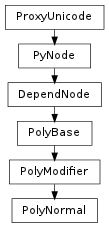pymel.core.nodetypes.PolyNormal¶

- class PolyNormal(*args, **kwargs)¶
class counterpart of mel function polyNormal
Control the normals of an object. This command works on faces or polygonal objects.
- caching(val=True, **kwargs)¶
Toggle caching for all attributes so that no recomputation is needed
Derived from mel command maya.cmds.polyNormal
- getConstructionHistory(**kwargs)¶
Turn the construction history on or off (where applicable). If construction history is on then the corresponding node will be inserted into the history chain for the mesh. If construction history is off then the operation will be performed directly on the object.Note:If the object already has construction history then this flag is ignored and the node will always be inserted into the history chain.
Derived from mel command maya.cmds.polyNormal
- getNodeState(**kwargs)¶
Defines how to evaluate the node. 0: Normal1: PassThrough2: Blocking3: Internally disabled. Will return to Normal state when enabled4: Internally disabled. Will return to PassThrough state when enabled5: Internally disabled. Will return to Blocking state when enabledFlag can appear in Create mode of commandFlag can have multiple arguments, passed either as a tuple or a list.
Derived from mel command maya.cmds.polyNormal
- getNormalMode(**kwargs)¶
This flag specifies the normal mode.0: reverse; (This flag is being phased out and is included for backwards compatibility only.)1: propagate; (This flag is being phased out and is included for backwards compatibility only.)2: conform; (This flag is being phased out and is included for backwards compatibility only.)3: reverse and cut; Reverse the normal(s) on the selected face(s). Selected faces are cut along their collective border and a new shell is created. The normals in the new shell are reversed from what they were before the action.4: reverse and propagate; Reverse the normal(s) on the selected face(s) and propagate this direction to all other faces in the shell.C: Default is 0 (reverse mode).Q: When queried, this flag returns an int.Common flags
Derived from mel command maya.cmds.polyNormal
- setNodeState(val=True, **kwargs)¶
Defines how to evaluate the node. 0: Normal1: PassThrough2: Blocking3: Internally disabled. Will return to Normal state when enabled4: Internally disabled. Will return to PassThrough state when enabled5: Internally disabled. Will return to Blocking state when enabledFlag can appear in Create mode of commandFlag can have multiple arguments, passed either as a tuple or a list.
Derived from mel command maya.cmds.polyNormal
- setNormalMode(val=True, **kwargs)¶
This flag specifies the normal mode.0: reverse; (This flag is being phased out and is included for backwards compatibility only.)1: propagate; (This flag is being phased out and is included for backwards compatibility only.)2: conform; (This flag is being phased out and is included for backwards compatibility only.)3: reverse and cut; Reverse the normal(s) on the selected face(s). Selected faces are cut along their collective border and a new shell is created. The normals in the new shell are reversed from what they were before the action.4: reverse and propagate; Reverse the normal(s) on the selected face(s) and propagate this direction to all other faces in the shell.C: Default is 0 (reverse mode).Q: When queried, this flag returns an int.Common flags
Derived from mel command maya.cmds.polyNormal